译林版四年级下册知识点
译林版四下英语知识点总结

译林版四下英语知识点总结一、四会单词school学校 subject科目,学科 see看到,看见 Chinese语文 Maths数学 Art 美术 Music音乐 Monday星期一 lesson课二、句型1. What subjects do you like?你喜欢什么课程?I like Chinese and Maths.我喜欢语文和数学。
2. Let’s go to the library.让我们一起去图书馆。
(Let’s=Let us)3. What lessons do we have this morning?我们今天上午有什么课?We have Music and PE.我们有音乐和体育。
4.Idon’t like PE and Music.我不喜欢体育和音乐。
(don’t=do not)三.语言点1. It’s time for school.(for+名词)It’s time to go to school. It’s time to play basketball. (to+动词/动词词组)2.区别lesson和subjectWhat _______ do you have this afternoon? I have eight ________ this morning. What _______ do you have this term(学期)? I have eight ________ at school.四、短语welcome back to欢迎回到…… new timetable新的课程表what subjects什么学科like Chinese喜欢语文what about ……怎么样It’s time for …该…….的时候了go to the playgroud去操场what lessons什么课this morning今天早上like Music喜欢音乐课this afternoon今天下午nice to see you见到你很高兴our new time table我们的新的时间表/课程表It's tim。
译林英语四年级下知识点和语法汇总

译林英语四年级下知识点和语法汇总Prepared on 22 November 2020译林版小学英语四年级下册知识要点Unit1 Our school subjects词汇 school subject see Chinese Maths Art Music lesson Monday PE Science fun go to playground afternoon句型 What subject do you like 你喜欢什么科目I like English. How about you 我喜欢英语。
那你呢I like Science. 我喜欢科学。
Welcome back to school. 欢迎回到学校。
What lessons do you have in the afternoon 你们下午有什么课Unit2 After school词汇 Wednesday Saturday Sunday Tuesday Thursday Friday get up 起床after school 放学后 go match today whenevery day每天句型 I have…我有……He/She has…他/她有……We don’t have…我们没有……What day is it today 今天星期几It’s Monday. 今天星期一。
What a pity! 真遗憾!All right. 好的。
Unit3 My day词汇 usually经常 go to school 去上学 in the morning 在上午in the afternoon在下午go home 回家 homework watch TV 看电视in the evening在晚上have lunch 吃中饭 have dinner 吃晚饭 go to bed 睡觉at night在夜里句型 when do you go to bed 你什么时间睡觉I go to bed at nine. 我9点睡觉Unit4 Drawing in the park词汇 park draw flower them boat river lakedrawing easy difficult try hill again句型 what can you see 你能看到什么I can …我能……Good idea! 好主意!Unit5 Seasons词汇seasons spring warm summer hot autumn cool winter cold fly kite放风筝 go boating 去划船 go swimming 去游泳 picnicgo climbing 去爬山 go skating 去滑冰 fine whose句型 in spring,it is warm 在春天里,它是暖和的。
(完整版)译林英语四年级下知识点及语法汇总
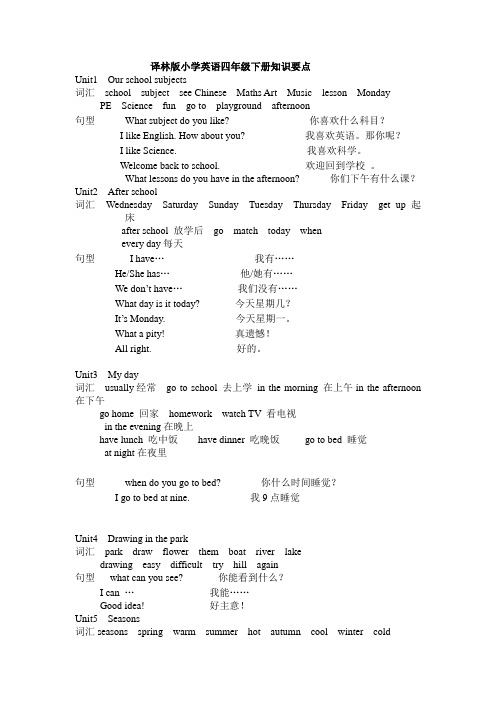
译林版小学英语四年级下册知识要点Unit1 Our school subjects词汇school subject see Chinese Maths Art Music lesson Monday PE Science fun go to playground afternoon句型What subject do you like? 你喜欢什么科目?I like English. How about you? 我喜欢英语。
那你呢?I like Science. 我喜欢科学。
Welcome back to school. 欢迎回到学校。
What lessons do you have in the afternoon? 你们下午有什么课?Unit2 After school词汇Wednesday Saturday Sunday Tuesday Thursday Friday get up 起床after school 放学后go match today whenevery day每天句型I have…我有……He/She has…他/她有……We don’t have…我们没有……What day is it today? 今天星期几?It’s Monday. 今天星期一。
What a pity! 真遗憾!All right. 好的。
Unit3 My day词汇usually经常go to school 去上学in the morning 在上午in the afternoon 在下午go home 回家homework watch TV 看电视in the evening在晚上have lunch 吃中饭have dinner 吃晚饭go to bed 睡觉at night在夜里句型when do you go to bed? 你什么时间睡觉?I go to bed at nine. 我9点睡觉Unit4 Drawing in the park词汇park draw flower them boat river lakedrawing easy difficult try hill again句型what can you see? 你能看到什么?I can …我能……Good idea! 好主意!Unit5 Seasons词汇seasons spring warm summer hot autumn cool winter coldfly kite放风筝go boating 去划船go swimming 去游泳picnic go climbing 去爬山go skating 去滑冰fine whose句型in spring,it is warm 在春天里,它是暖和的。
译林版小学英语四年级下册知识点汇总
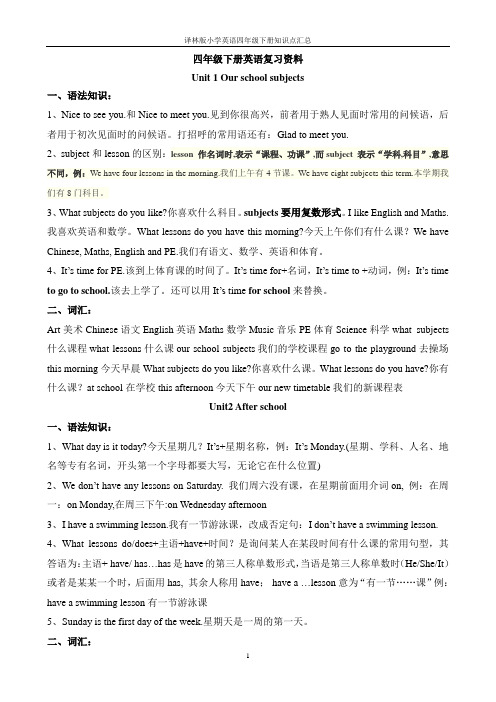
四年级下册英语复习资料Unit 1 Our school subjects一、语法知识:1、Nice to see you.和Nice to meet you.见到你很高兴,前者用于熟人见面时常用的问候语,后者用于初次见面时的问候语。
打招呼的常用语还有:Glad to meet you.2、subject和lesson的区别:lesson 作名词时,表示“课程、功课”,而subject 表示“学科,科目”,意思不同,例:We have four lessons in the morning.我们上午有4节课。
We have eight subjects this term.本学期我们有8门科目。
3、What subjects do you like?你喜欢什么科目。
subjects要用复数形式。
I like English and Maths.我喜欢英语和数学。
What lessons do you have this morning?今天上午你们有什么课?We have Chinese, Maths, English and PE.我们有语文、数学、英语和体育。
4、It’s time for PE.该到上体育课的时间了。
It’s time for+名词,It’s time to +动词,例:It’s time to go to school.该去上学了。
还可以用It’s time for school来替换。
二、词汇:Art美术Chinese语文English英语Maths数学Music音乐PE体育Science科学what subjects 什么课程what lessons什么课our school subjects我们的学校课程go to the playground去操场this morning今天早晨What subjects do you like?你喜欢什么课。
What lessons do you have?你有什么课?at school在学校this afternoon今天下午our new timetable我们的新课程表Unit2 After school一、语法知识:1、What day is it today?今天星期几?It’s+星期名称,例:It’s Monday.(星期、学科、人名、地名等专有名词,开头第一个字母都要大写,无论它在什么位置)2、We don’t have any lessons on Saturday. 我们周六没有课,在星期前面用介词on, 例:在周一:on Monday,在周三下午:on Wednesday afternoon3、I have a swimming lesson.我有一节游泳课,改成否定句:I don’t have a swimming lesson.4、What lessons do/does+主语+have+时间?是询问某人在某段时间有什么课的常用句型,其答语为:主语+ have/ has…has是have的第三人称单数形式,当语是第三人称单数时(He/She/It)或者是某某一个时,后面用has, 其余人称用have;have a …lesson意为“有一节……课”例:have a swimming lesson有一节游泳课5、Sunday is the first day of the week.星期天是一周的第一天。
译林英语四年级下知识点和语法汇总

译林版小学英语四年级下册知识要点Unit1 Our school subjects词汇 school subject see Chinese Maths Art Music lesson MondayPE Science fun go to playground afternoon句型What subject do you like?你喜欢什么科目?I like English. Howabout you?我喜欢英语。
那你呢?I like Science.我喜欢科学。
Welcome back to school.欢迎回到学校。
What lessons do you have in the afternoon?你们下午有什么课?Unit2 After school词汇Wednesday Saturday Sunday Tuesday Thursday Friday get up起床after school放学后go match today whenevery day每天句型I have我有He/She has他/她有We don’t have我们没有What day is it today?今天星期几?It ’s Monday.今天星期一。
What a pity!真遗憾!All right.好的。
Unit3 My day词汇usually经常go to school去上学in the morning在上午in the afternoon在下午go home 回家 homework watch TV看电视in the evening在晚上have lunch吃中饭have dinner吃晚饭go to bed睡觉at night在夜里句型when do you go to bed?你什么时间睡觉?I go to bed at nine.我9点睡觉Unit4 Drawing in the park词汇 park draw flower them boat river lakedrawing easy difficult try hill again句型what can you see?你能看到什么?I can我能Good idea!好主意!Unit5 Seasons词汇 seasons spring warm summer hot autumn cool winter coldfly kite放风筝go boating去划船go swimming去游泳picnic goclimbing 去爬山 go skating去滑冰fine whose句型in spring,it is warm在春天里,它是暖和的。
(完整版)译林英语四年级下知识点和语法汇总
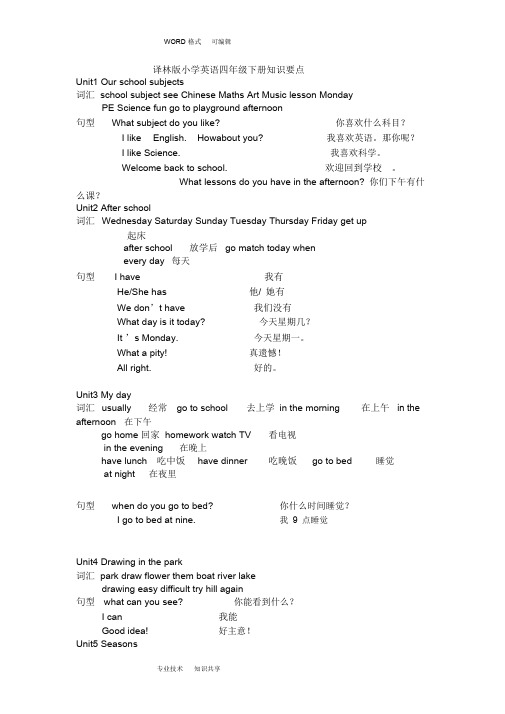
译林版小学英语四年级下册知识要点Unit1 Our school subjects词汇 school subject see Chinese Maths Art Music lesson MondayPE Science fun go to playground afternoon句型What subject do you like?你喜欢什么科目?I like English.Howabout you?我喜欢英语。
那你呢?I like Science.我喜欢科学。
Welcome back to school.欢迎回到学校。
What lessons do you have in the afternoon?你们下午有什么课?Unit2 After school词汇Wednesday Saturday Sunday Tuesday Thursday Friday get up起床after school放学后go match today whenevery day每天句型I have我有He/She has他/她有We don’t have我们没有What day is it today?今天星期几?It ’s Monday.今天星期一。
What a pity!真遗憾!All right.好的。
Unit3 My day词汇usually经常go to school去上学in the morning在上午in the afternoon在下午go home 回家 homework watch TV看电视in the evening在晚上have lunch吃中饭have dinner吃晚饭go to bed睡觉at night在夜里句型when do you go to bed?你什么时间睡觉?I go to bed at nine.我9点睡觉Unit4 Drawing in the park词汇 park draw flower them boat river lakedrawing easy difficult try hill again句型what can you see?你能看到什么?I can我能Good idea!好主意!Unit5 Seasons词汇 seasons spring warm summer hot autumn cool winter coldfly kite放风筝go boating去划船go swimming去游泳picnic goclimbing去爬山 go skating去滑冰fine whose句型in spring,it is warm在春天里,它是暖和的。
译林版英语四年级下册重点知识总结

译林版英语四年级下册重点知识总结本文档对译林版英语四年级下册的重点知识进行总结,帮助学生们复和掌握学过的内容。
Unit 1: My Family- 词汇:family members(家庭成员)、father(父亲)、mother(母亲)、brother(兄弟)、sister(姐妹)- 句型:My father is tall.(我的爸爸个子高。
)、I have a brother.(我有一个兄弟。
)Unit 2: My School- 词汇:school(学校)、teacher(老师)、classroom(教室)、desk(课桌)、book(书)- 句型:This is my school.(这是我的学校。
)、We have a big classroom.(我们有一个大教室。
)Unit 3: My Friends- 词汇:friend(朋友)、play(玩)、together(一起)、happy(快乐)- 句型:I have many friends.(我有很多朋友。
)、We play together.(我们一起玩。
)Unit 4: My Day- 词汇:get up(起床)、go(去)、eat(吃)、sleep(睡觉)- 句型:I get up at 7 o'clock.(我7点起床。
)、I go to school.(我去上学。
)Unit 5: Our World- 词汇:world(世界)、animals(动物)、plants(植物)、forest(森林)、ocean(海洋)- 句型:We live in this world.(我们生活在这个世界。
)、Animals and plants are important.(动物和植物很重要。
)Unit 6: At the Farm- 词汇:farm(农场)、farmer(农民)、animals(动物)、vegetables(蔬菜)、fruits(水果)- 句型:I like the farm.(我喜欢农场。
(译林版)四年级英语(下册)知识要点精心整理
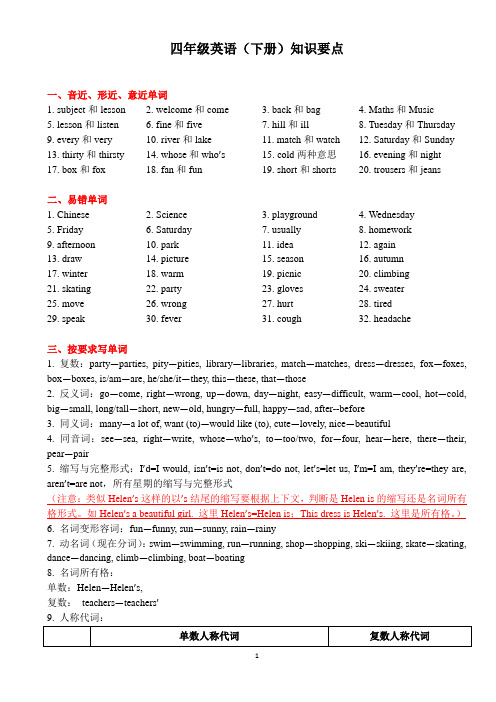
四年级英语(下册)知识要点一、音近、形近、意近单词1. subject和lesson2. welcome和come3. back和bag4. Maths和Music5. lesson和listen6. fine和five7. hill和ill8. Tuesday和Thursday9. every和very 10. river和lake 11. match和watch 12. Saturday和Sunday 13. thirty和thirsty 14. whose和who’s 15. cold两种意思16. evening和night17. box和fox 18. fan和fun 19. short和shorts 20. trousers和jeans二、易错单词1. Chinese2. Science3. playground4. Wednesday5. Friday6. Saturday7. usually8. homework9. afternoon 10. park 11. idea 12. again13. draw 14. picture 15. season 16. autumn17. winter 18. warm 19. picnic 20. climbing21. skating 22. party 23. gloves 24. sweater25. move 26. wrong 27. hurt 28. tired29. speak 30. fever 31. cough 32. headache三、按要求写单词1. 复数:party—parties, pity—pities, library—libraries, match—matches, dress—dresses, fox—foxes, box—boxes, is/am—are, he/she/it—they, this—these, that—those2. 反义词:go—come, right—wrong, up—down, day—night, easy—difficult, warm—cool, hot—cold, big—small, long/tall—short, new—old, hungry—full, happy—sad, after--before3. 同义词:many—a lot of, want (to)—would like (to), cute—lovely, nice—beautiful4. 同音词:see—sea, right—write, whose—who’s, to—too/two, for—four, hear—here, there—their, pear—pair5. 缩写与完整形式:I’d=I would, isn’t=is not, don’t=do not, let’s=let us, I’m=I am, they’re=they are, aren’t=are not,所有星期的缩写与完整形式(注意:类似Helen’s这样的以’s结尾的缩写要根据上下文,判断是Helen is的缩写还是名词所有格形式。
江苏译林版小学英语四年级下册单元知识点总结

四下Unit 1 Our school subjects重点词句总结一、单词:1.school学校2.subject课程3.back背部;后面4.see看见,看到5.timetable课程表;时间表6.English英语(课)7.Chinese语文(课)8.Maths数学(课) 9.Art美术(课)10.PE体育(课) 11.Music音乐(课)12.Science科学(课)13.fun乐趣,快乐 14.playground操场15.lesson课16.Monday星期一17.afternoon下午二、词组:1. our school subjects 我们的学校课程2. see you 见到你/(再见)3.like Chinese and Maths 喜欢语文和数学4. what subjects 什么课程5. like English 喜欢英语6. time for PE 该上体育课的时间7. have a Music lesson 有/上一堂音乐课8. what lessons 什么课9. have Art and Maths 有美术课和数学课10. my school subjects 我的学校课程11. welcome back to school 欢迎回到学校12. go to the playground 去操场13. our new timetable 我们的新课程表14. have a Science lesson 有/上一堂科学课15. this morning 今天早上16. this afternoon 今天下午17. like PE 喜欢体育课18. don’t like that / do not like that不喜欢那个19. don’t skate 不要滑冰20. make a cake 做一个蛋糕21. at school 在学校 22. all like Computer Studies 都喜欢电脑课23. write the names of some school subjects 写一些学校课程的名称24. ask about school subjects 询问学校课程三、句子:1. Welcome back to school, class. 欢迎回到学校,同学们。
(完整版)译林英语四年级下知识点及语法汇总
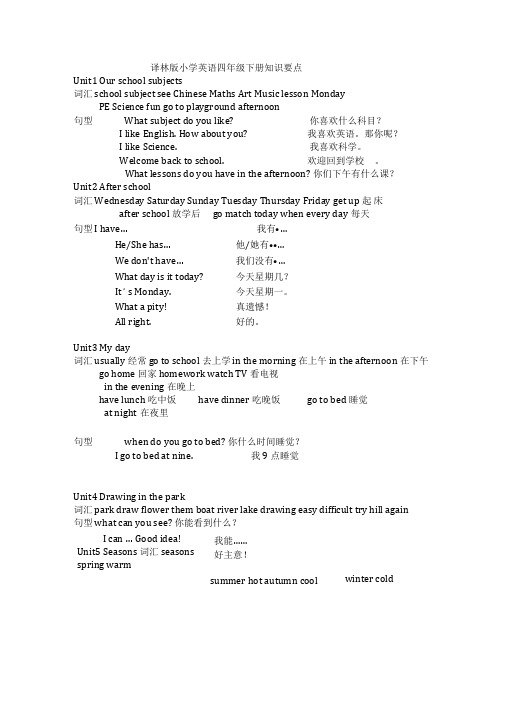
译林版小学英语四年级下册知识要点Unit1 Our school subjects词汇school subject see Chinese Maths Art Music lesson MondayPE Science fun go to playground afternoon句型What subject do you like? 你喜欢什么科目?I like English. How about you? 我喜欢英语。
那你呢?I like Science. 我喜欢科学。
Welcome back to school. 欢迎回到学校。
What lessons do you have in the afternoon? 你们下午有什么课?Unit2 After school词汇Wednesday Saturday Sunday Tuesday Thursday Friday get up 起床after school 放学后go match today when every day 每天句型I have…我有•…He/She has…他/她有••…We don't have…我们没有•…What day is it today? 今天星期几?It ’ s Monday. 今天星期一。
What a pity! 真遗憾!All right. 好的。
Unit3 My day词汇usually 经常go to school 去上学in the morning 在上午in the afternoon 在下午go home 回家homework watch TV 看电视in the evening 在晚上have lunch 吃中饭have dinner 吃晚饭go to bed 睡觉at night在夜里句型when do you go to bed? 你什么时间睡觉?I go to bed at nine. 我9 点睡觉Unit4 Drawing in the park词汇park draw flower them boat river lake drawing easy difficult try hill again句型what can you see? 你能看到什么?I can … Good idea! Unit5 Seasons 词汇seasons spring warm我能……好主意!summer hot autumn cool winter coldfly kite 放风筝 go boating 去划船 go swimming 去游泳 picnic goclimbing 去爬山 go skating 去滑冰 fine whose句型 in spring,it is warm 在春天里,它是暖和的。
译林版四下英语知识点总结
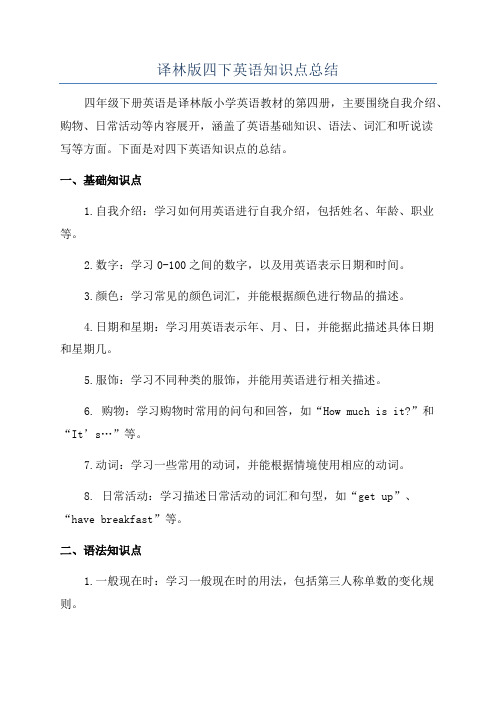
译林版四下英语知识点总结四年级下册英语是译林版小学英语教材的第四册,主要围绕自我介绍、购物、日常活动等内容展开,涵盖了英语基础知识、语法、词汇和听说读写等方面。
下面是对四下英语知识点的总结。
一、基础知识点1.自我介绍:学习如何用英语进行自我介绍,包括姓名、年龄、职业等。
2.数字:学习0-100之间的数字,以及用英语表示日期和时间。
3.颜色:学习常见的颜色词汇,并能根据颜色进行物品的描述。
4.日期和星期:学习用英语表示年、月、日,并能据此描述具体日期和星期几。
5.服饰:学习不同种类的服饰,并能用英语进行相关描述。
6. 购物:学习购物时常用的问句和回答,如“How much is it?”和“It’s…”等。
7.动词:学习一些常用的动词,并能根据情境使用相应的动词。
8. 日常活动:学习描述日常活动的词汇和句型,如“get up”、“have breakfast”等。
二、语法知识点1.一般现在时:学习一般现在时的用法,包括第三人称单数的变化规则。
2. 疑问句:学习疑问句的构成和使用,如“Do you like…?”和“Does she have…?”等。
3. 简单的否定句:学习简单的否定句的构成,如“I don’t like…”和“She doesn’t have…”等。
4. 介词的使用:学习一些常见的介词及其用法,如“in”、“on”、“at”等。
5.句子的一般结构:学习句子的基本结构,包括主语和谓语的构成,以及其他成分的位置关系。
三、词汇知识点1. 常见的名词:学习一些常见的名词,如“apple”、“book”、“flower”等。
2. 形容词:学习一些常见的形容词,用于描述物品的特征,如“big”、“small”、“long”等。
3. 常见的动词:学习一些常见的动词,如“read”、“write”、“listen”等。
4. 数词:学习0-100之间的基数词和序数词,如“one”、“first”等。
译林版英语四年级下册知识要点整理

译林版英语四年级下册知识要点整理本文档总结了译林版英语四年级下册的知识要点,内容如下:1. Unit 1: My Family- 研究家庭成员的英文表达,如father, mother, sister, brother等。
- 研究询问和回答关于家庭成员的问题,如"Who is this?"和"This is my father."等。
2. Unit 2: My Day- 研究描述一天中的活动,如get up, have breakfast, go to school 等。
- 研究询问和回答关于日常活动的问题,如"What do you do in the morning?"和"I usually get up at 7 o'clock."等。
3. Unit 3: At School- 研究学校的相关词汇,如classroom, teacher, student等。
- 研究询问和回答关于学校生活的问题,如"What's in the classroom?"和"There are desks and chairs in the classroom."等。
4. Unit 4: Sports Day- 研究各种体育运动的名称,如running, jumping, swimming等。
- 研究询问和回答关于体育运动的问题,如"What sports can you do?"和"I can swim."等。
5. Unit 5: In the Park- 研究公园中常见的事物和活动,如tree, flower, play等。
- 研究用英语表达在公园中玩的内容,如"I like playing on the swing."等。
译林版四年级(下册)知识点概述

译林版四年级(下册)知识点概述语文- 汉字:研究和巩固各种常用字的写法和读音。
- 阅读理解:培养阅读惯,提高阅读理解能力。
- 作文:研究基本的写作技巧,包括叙事、描写等。
- 诗词:研究优美的诗词,培养语感和表达能力。
- 口语交际:培养良好的口头表达能力,包括朗读、演讲等。
数学- 数的认识:巩固1-1000的数的读法、写法和数线的认识。
- 运算与应用:掌握加减法和乘法的运算方法,并能运用于实际问题。
- 组织数据:研究整理、综合和分析数据的方法。
- 图形与几何:了解图形的名称、性质和分类,以及简单的几何图形的构成。
英语- 听力:培养听力理解能力,掌握基本的日常用语和问答句型。
- 语法:研究基本的语法规则,包括动词、名词、形容词等的用法。
- 阅读与写作:理解简单的英语文章,能够进行简单的书面表达。
- 口语交际:培养基本的口语表达能力,能够进行日常对话和交流。
自然- 生物:了解动物的分类特征和生活性,认识常见植物的特点。
- 物理:认识有关力的知识,了解简单的机械原理。
- 化学:介绍常见物质的性质和变化规律,培养观察实验的能力。
- 地理:研究地球和环境的基本知识,了解人类地理环境。
社会- 历史:了解古代历史和一些历史事件的发生。
- 地理:研究国内外的地理知识,了解各个国家的特点。
- 政治:了解社会生活中的一些政治现象和基本政治常识。
美术- 画画:培养对颜色、形状和线条的认知,进行简单的绘画。
- 手工制作:研究使用简单的材料和工具进行手工制作。
音乐- 唱歌:培养音乐鉴赏和演唱的能力,研究一些儿歌和流行歌曲。
体育- 全面发展:参与各类体育运动,培养身体协调和运动技能。
以上是译林版四年级(下册)的知识点概述,内容涵盖语文、数学、英语、自然、社会、美术、音乐和体育等多个学科,旨在帮助学生全面发展各方面能力。
(译林版)四年级英语(下册)知识要点精心整理

四年级英语(下册)知识要点一、音近、形近、意近单词1. subject和lesson2. welcome和come3. back和bag4. Maths和Music5. lesson和listen6. fine和five7. hill和ill8. Tuesday和Thursday9. every和very 10. river和lake 11. match和watch 12. Saturday和Sunday 13. thirty和thirsty 14. whose和who’s 15. cold两种意思16. evening和night17. box和fox 18. fan和fun 19. short和shorts 20. trousers和jeans二、易错单词1. Chinese2. Science3. playground4. Wednesday5. Friday6. Saturday7. usually8. homework9. afternoon 10. park 11. idea 12. again13. draw 14. picture 15. season 16. autumn17. winter 18. warm 19. picnic 20. climbing21. skating 22. party 23. gloves 24. sweater25. move 26. wrong 27. hurt 28. tired29. speak 30. fever 31. cough 32. headache三、按要求写单词1. 复数:party—parties, pity—pities, library—libraries, match—matches, dress—dresses, fox—foxes, box—boxes, is/am—are, he/she/it—they, this—these, that—those2. 反义词:go—come, right—wrong, up—down, day—night, easy—difficult, warm—cool, hot—cold, big—small, long/tall—short, new—old, hungry—full, happy—sad, after--before3. 同义词:many—a lot of, want (to)—would like (to), cute—lovely, nice—beautiful4. 同音词:see—sea, right—write, whose—who’s, to—too/two, for—four, hear—here, there—their, pear—pair5. 缩写与完整形式:I’d=I would, isn’t=is not, don’t=do not, let’s=let us, I’m=I am, they’re=they are, aren’t=are not,所有星期的缩写与完整形式(注意:类似Helen’s这样的以’s结尾的缩写要根据上下文,判断是Helen is的缩写还是名词所有格形式。
译林版小学英语四年级下册知识点汇总

译林版小学英语四年级下册知识点汇总1.What do you do after school。
你放学后做什么?这里的do是指“做”、“进行”的意思,常用于询问某人的日常活动。
例如:What do you do on weekends。
你周末都做什么?2.I usually play with my friends。
我通常和朋友们玩。
这里的usually表示“通常、经常”的意思,用于描述某个惯或行为的频率。
例如:I usually go to bed at 10pm。
我通常晚上10点睡觉。
3.Sometimes I watch TV。
有时候我看电视。
这里的sometimes表示“有时候、偶尔”的意思,用于描述某个行为或状态的间歇性。
例如:Sometimes I eat ice cream for dessert。
有时候我会吃冰淇淋作为甜点。
4.What about you。
你呢?这是一句常用于交流的问句,用于询问对方的情况或看法。
例如:What about you。
Do you like playing basketball。
你呢?你喜欢打篮球吗?二、词汇:After school 放学后Play 玩耍XXX 朋友们Usually 通常Watch 看TV 电视Sometimes 有时候Eat 吃Ice cream 冰淇淋Dessert 甜点What about you。
你呢?1.今天星期几?用It’s + 星期名称来回答,例如:It’XXX 在专有名词前要大写第一个字母。
2.如果要表达某一天是否有课,可以用介词on + 星期名称,例如:XXX在星期三下午可以说:on XXX.3.要表达没有某一节课,可以用否定句式,例如:XXX.4.询问某人在某段时间有什么课的常用句型是:What lessons do/does + 主语 + have + 时间?答语为:主语 +have/has…has是have的第三人称单数形式,当语是第三人称单数时(He/She/It)或者是某某一个时,后面用has,其余人称用have;have a…lesson意为“有一节……课”例:have a swimming lesson有一节游泳课5.星期天是一周的第一天。
译林版英语四年级下册知识点归纳

译林版英语四年级下册知识点归纳1.在星期前使用介词on, 例如: on Monday, XXX。
2.在时间点前使用介词at, 例如:XXX, XXX forty-five。
3.在一年四季中使用介词in, 例如: in spring, in summer。
4.第三人称单数动词变化规则: have变为has, 或在单词后加s, 例如: (1) XXX(2) XXX(3) My hand hurts.5.在can、want to、don’t后面加动词原形, 例如: (1)She/He/David can have XXX(2) XXX(3) Don’t swim in the river。
it’s very dangerous.6.some一般用于肯定句和征求别人意见的疑问句中, 例如: (1) I can see some cakes on the table。
(2) Can I have some cakes。
(3) Would you like some cakes。
any一般用于疑问句和否定句中, 例如: (1) Do you have any cakes。
(2) Can you see any flowers under the tree。
(3) We don’t have any XXX.7.be动词am、is、are的用法:am只和I搭配, is和一个人或一件物品或it、this搭配, are和两个及两个人以上或两件或两件以上物品或we、they、these、those搭配, 例如:(1) Iam very cold。
(2) She/He/David is very hot。
(3) The cat is veryhungry。
(4) It is a fine day。
(5) Whose dress is this。
(6)We/They are ill.7.XXX。
8.Helen and Mike are XXX。
- 1、下载文档前请自行甄别文档内容的完整性,平台不提供额外的编辑、内容补充、找答案等附加服务。
- 2、"仅部分预览"的文档,不可在线预览部分如存在完整性等问题,可反馈申请退款(可完整预览的文档不适用该条件!)。
- 3、如文档侵犯您的权益,请联系客服反馈,我们会尽快为您处理(人工客服工作时间:9:00-18:30)。
译林版小学四年级英语下册知识点复习总结Unit 1 Our school subjects一.单词school 学校 subject 科目,学科see 看到,看见Chinese 语文Maths 数学 Art 美术Music 音乐 Monday 星期一 lesson 课二.词组welcome back to……欢迎回到……nice to see you 见到你很高兴what subject 什么课程 new time table 新的时间表/课程表our new time table 我们的新的时间表/课程表 like Chinese 喜欢语文It's time for……是做什么的时候到了go to去……go to the playground 去操场this morning 今天上午this afternoon 今天下午 new subject 新课程what day 星期几what lesson 什么课our school subject 我们的课程三句型1.What subjects do you like?你喜欢什么课程?I like Chinese and Maths.我喜欢语文和数学。
2.Let’s go to the library.让我们一起去图书馆。
(Let’s=Let us)3.What lessons do we have this morning?我们今天上午有什么课?We have Music and PE.我们有音乐和体育。
4.Idon’t like PE and Music. 我不喜欢体育和音乐。
(don’t=do not)5.It’s time for PE. 该上体育课了。
(for+名词)It’s time to go to school. It’s time to play basketball. (to+动词/动词词组) 6. 区别lesson 和subjectWhat _______ do you have this afternoon? I have eight ________ this morning. What _______ do you have this term(学期)? I have eight ________ at school.四发音Aa /ei/ cake 蛋糕grape 葡萄make 做skate 滑冰table 桌子name 名字plate 盘子take 拿,带wake 醒来baby 婴儿五练习(一)、单项选择。
1. How many _______do you have this term(学期)?We have five. A. subject B. a subject C. subjects D. an subject2.It’s time _______ English. Let’s go to the classroom(教室)A.atB. forC. inD. on3.The Science book is_______the bedroom,________thechair.A on; inB in; onC at; onD in; in4.__________ a timetable for you.A.HereB. Here’s C .Here are D. It is5.A: How much is the Art book? B: _____________A It’s five.B They’re four yuan. C. It’s four yuan. D. Theyare four6.—What ________ do you like? —I like English. It is fun.A. subjectB. subjectsC. a subjectD. an subject(二).连词成句。
1. you like (?) _______________________________2.subjects do you how (?) _______3.three lessons have morning (.)4.do what have you afternoon (?) ____________________5. an how is much English (?) _____(三).根据中文,翻译句子。
1.这个学期你们有多少门学科,有7门。
_____ ________ ________ do you have this term(学期)?We have ______.2.现在是上数学课的时候,让我们到教室去。
It’s time _______ _______ ________. Let’s go to the classroom(教室).3.你喜欢什么课?我喜欢英语,它是有趣的What ________ do you like? I like _________. It’s ___________.Unit 2 After school一、单词Monday 星期一Tuesday 星期二Wednesday 星期三Thursday 星期三Friday 星期五Saturday 星期六Sunday 星期日get up 起床二、词组play table tennis 打乒乓球what day 星期几 a football match 一场足球比赛a swimming lesson 一节游泳课all right好的get up起床every day每天good morning早上好at five在五点钟what lessons 什么课on Saturday在星期六play table tennis 打乒乓球what day is it today?今天星期几?what a pity真遗憾come and play table tenn来打乒乓球at school 在学校after school 放学后二.句型1.What day is it today? 今天星期几?It's Friday. 今天是星期五。
拓展:What date it is today?今天是几号?It’s August 13th.今天是八月13号。
What time is it now? 现在时几点?It’s half past ten. 现在时十点半。
2.She has a skating lesson. 她有一堂溜冰课。
3.We don’t have any lessons on Wednesday.我们在星期三没有课。
4.Let’s go and play table tennis.让我们去打乒乓球。
5.I have a basketball match today. 今天我有一场篮球比赛。
6.When do you get up every day? 你每天几点起床?7. I get up at five. / At five. 我五点钟起床。
三、短语Aa / ?/ bag书包cap 帽子hamburger 汉堡包sandwich 三明治snack 快餐dad 爸爸Maths 数学match 比赛Saturday 星期六apple 苹果五.练习单项选择。
1.---Can you play ball games _____ ? ---Yes, I can.A.goodB. niceC. well2. ---Oh, I can’t swim. ---Don’t be sad. I can’t swim _____ .A. tooB. eitherC. good3. --- _____ ? ---No, I like Science. It’s fun.A. Do you like ScienceB. Do you like ChineseC. What do you like4. ---Can you _______ ? ---No. But I have a lesson.A.swim; swimB. swim; swimmingC. swimming; swim4.---I can’t go to play table tennis. ---______!A. What a pityB. How niceC. How beautifulUnit 3 My day一、单词usually 通常常常homework 家庭作业lunch午饭dinner晚餐watch观看evening傍晚;晚上night夜;深夜there在那里here这里read阅读;朗读二、词组go to school上学at seven forty 在七点四十分in the morning 在早上have dinner吃晚饭have lunch吃午饭in the afternoon在下午do my homework做家庭作业every day每天what time什么时间over there 在那边a big cake一块大蛋糕like cakes喜欢蛋糕my day我的一天four lessons四节课five subjects四门课程in the evening 在晚上at seven在七点watch TV看电视go to bed睡觉play football踢足球at night在夜里三、句型1.When do you get up in the morning?你上午什么时候起床?I get up at six o’clock. 我六点起床。
2.I have lunch at twelve fifteen. 我在12 点15 分吃午饭。
3.I usually go to school at seven forty.我通常在7 点40 去学校。
4.I go to bed at nine on Friday. 我星期五九点睡觉。
(一句话中如果有两个时间,小时间放在大时间之前。
)5.What time is it now?现在几点?It’s ten thirty-two6.What a big cake!多么大的一个蛋糕啊!7.时间的表达。
十点三十二分ten thirty-two七点五十八分seven fifty-eight四.发音E e / i: / me 我she 她green 睡觉sleep 睡觉three 三week 星期,周see 看到meet 遇见evening 晚上五练习(一)按要求改写句子。
1.It’s time to go to bed.(改为同义句)It’s time_______ _______ .2.对画线部分提问)_____________________usually do your homework ?3. It’s now. (对画线部分提问) _______ _______ is it now ?Unit 4 Drawing in the park一、单词park公园draw 画flower 花them他们,她们,它们boat 小船easy简单的 river河,江lake湖,湖泊boat 小船difficult 困难的try尝试hill小山again 再次二、词组draw some pictures画一些画good idea好主意over there那边some flowers 一些花draw them画它们on the river在河面上this big box 这只大盒子have a look 看一看 on the lake在湖面上try again再试一试in the park 在公园里some pictures 一些图画well done 好样的,干得好can you draw 你会画吗?in the boat 在小船里a tree 一棵树on the hill 在小山上drawing in the park 在公园里画画see a boat 看到一条小船make a cake 做一个蛋糕before ten 十点之前三、句型1. Let’s draw some pictures here.让我们在这里画画。
